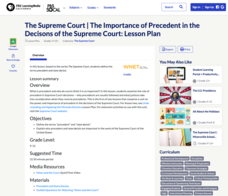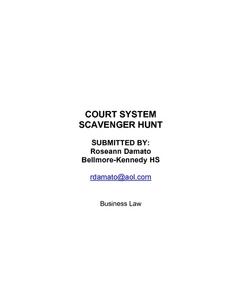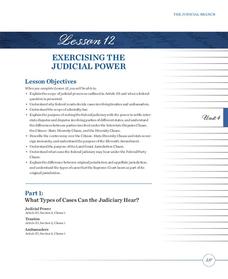Curated OER
Lesson 4: The Judiciary: A Brief Introduction to the Courts System
Focusing on the judicial branch of government, the fourth lesson in this series explores the structure of the US courts system. Beginning with an engaging activity based on the short story The Lady or the Tiger, students go on to examine...
School Improvement in Maryland
Court Proceedings Civil Cases
What's the difference between civil and criminal law? How do the court proceedings differ in these two types of trials? How do the standards of proof differ? Why do these differences exist? As part of their examination of the US court...
Heritage Foundation
Courts and Judges
If the Supreme Court is so supreme, why do all cases not just start there? High schoolers learn why every case does not start at the Supreme Court as well as the importance of hierarchy in the US judicial system in the 11th installment...
PBS
The Supreme Court: The Importance of Precedent in the Decisions of the Supreme Court
People often hear the words precedent and Supreme Court together, but why? A resource on the Supreme Court includes a variety of discussion questions, handouts that guide young historians, a video about Nixon and the court system, and...
Judicial Learning Center
State Courts vs. Federal Courts
Popular culture often portrays the Feds as the most fearsome of law enforcement agencies. Yet, someone charged with a crime is considerably more likely to end up in a state court. The lesson, one of six covering the Organization of the...
Judicial Learning Center
The U.S. Supreme Court
How do Supreme Court justices determine which cases to consider? What happens when the Supreme Court decides not to take a case? The lesson explores important questions and others in the field of criminology. It focuses on the appeals...
Advocates for Human Rights
Mock Immigration Court
As part of a unit study of immigration, class members participate in a mock Immigration Court activity in which they argue four cases before an immigration judge.
Curated OER
Landmark Supreme Court Cases And The Constitution
Have an engaging class discussion on the Bill of Rights, U.S. Constitution, and the Supreme Court. Learners examine multiple aspects of the Marbury v. Madison case and the impact that case had on the judicial system in the U.S. Web...
PBS
The Supreme Court: Define and Classify the Powers Associated with Federalism
Federalism may sound to some like one, big vocabulary word ... but it is much more than that. A short video introduces class members to the powers associated with the Supreme Court and its role in balancing the powers under federalism.
Curated OER
It's Your Right: A Civil Rights Brochure
Learners examine the US Constitution, Bill of Rights, and Supreme Court cases in order to broaden their understanding of the US Judicial System. They research a variety of textual and Internet resources to create a tri-fold brochure,...
Curated OER
Supreme Court Decisions and Their Effect On Us
Consider five Supreme Court cases and how their outcomes have directly affected the American population. Government students research and compose a 1-2 page pager outlining the examples of our daily life that have specifically been...
Minnesota Courts
Inside Straight: the Third Branch
Learners use the worksheet as they view the film Inside Straight: the Third Branch. Multiple case studies and the history of the judicial branch of the US government are included via hyperlink and act as the topics of discussion...
Judicial Learning Center
Judicial Independence: What’s Wrong with This Court?
Why is it important for judges to operate independently of politics or other branches of government? Scholars ponder the question as they examine video clips, case studies, excerpts of the US Constitution, and an interactive computer...
Teaching Tolerance
Racial Disparity in the Criminal Justice System
Explore the impact of the war on drugs in a thought-provoking lesson for high school academics. Young historians delve into the world of the criminal justice system and the racial disparity that occurs in the US. The resource provides...
Curated OER
Court System Scavenger Hunt
Students are assign a particular Federal or State Court. They are asked to make a poster of the court they have been assigned. Students are told that the poster should include a list of the types of cases that particular court hears. ...
Judicial Learning Center
Civil Rights and Equal Protection
Almost every American is familiar with the Supreme Court case of Brown vs. Board of Education. Far fewer understand the constitutional reasoning or the wide-ranging consequences of the ruling in the field of criminology. The interesting...
Judicial Learning Center
The Ratification Debate
Most Americans profess their love for the US Constitution, but this was not always the case. An informative lesson overviews the debate between the Federalists and Anti-Federalists by summarizing the main arguments of each side. It...
Curated OER
The Legacy of the Warren Court
Students examine the major decisions by the Supreme Court when Warren was the Chief Justice. In groups, they research the life and other works of Earl Warren and discuss how ones background can influence decisions. They also examine...
Curated OER
Black Skin, White Justice: Race Matters in the Criminal Justice System
Students examine the effects of race in the criminal justice system. As a class, they brainstorm a list of instances when the offender has been an African American and he is not treated fairly in court based on his race. They analyze...
Curated OER
The Jury System
Students analyze Article III and the Seventh Amendment. In this US Justice instructional activity, students research the US jury system and complete a Student Jury questionnaire. Students will discuss the impact the implementation of the...
DocsTeach
U.S. v. Amistad: A Case of Jurisdiction
Just what is jurisdiction and why does it matter? A helpful activity takes academics on a journey to understand how judicial jurisdiction works. Scholars read excerpts from the Constitution and court documents to understand the process...
Curated OER
How was the Constitution Used to Organize the New Government?
How did the United States Congress determine how the new president and vice president would be named when the nation was first established? Who would provide money for the government, and how would the executive branch be organized?
Heritage Foundation
Exercising Judicial Power
We should all do more exercising, but should the judicial branch as well? High schoolers develop their understanding of what powers the judicial branch carries because of the US Constitution, as well as where their limits lie in the...
School Improvement in Maryland
Analysis of Marbury v. Madison
Should the United States Supreme Court have the power of judicial review? Instructors guide class members through a review of Marbury v. Madison and assist class members in writing a brief of the case. As independent practice,...

























